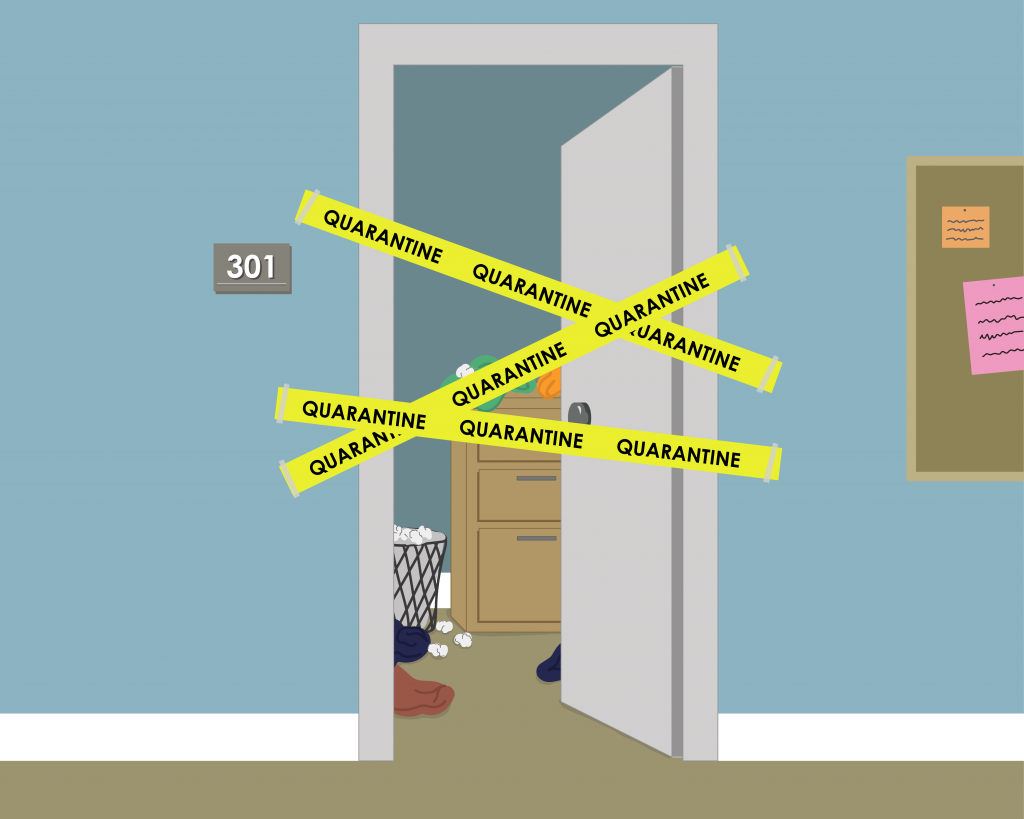As positive COVID-19 cases continue to rise at Binghamton University, quarantined and isolated students are feeling the impact.
On Friday, Feb. 19, New York State (NYS) Gov. Andrew Cuomo adjusted the threshold for when SUNY campuses are required to move to solely remote-only classes. The previous 100-person threshold has now been adjusted to a 5 percent threshold on a rolling 14-day basis. While BU successfully remained under this threshold during the Feb. 13 to Feb. 26 period, only 38 percent of University-provided isolation and quarantine spaces remain available.
According to Paola Mignone, director of Residential Life at BU, Residential Life has made a number of accommodations in response to the uptick in positive cases.
“We have converted Old Digman Hall from quarantine housing to isolation housing,” Mignone wrote in an email. “The students who were quarantined in Old Digman [Hall] were relocated to the Quality Inn. Old Rafuse [Hall] and Rockland [Hall] are also being used for isolation housing. The University has additional quarantine space reserved if needed. It should be noted that for every isolation case, through contact tracing, we identify additional students who have been exposed to the person who tested positive. This can result in two, three, four or more students requiring quarantine housing for every exposure case identified. We continue to identify additional available spaces both on campus and off campus to prepare for any additional virus spread among our student population.”
Once students are released from either quarantine or isolation housing, Mignone said the spaces are “deep cleaned and sanitized” by staff who have been properly trained to disinfect rooms that house sick or exposed students.
However, one student who has been in isolation for the past week who wished to remain anonymous, said their room “was either not cleaned at all or cleaned very poorly.”
“One of the toilets appeared to have dried vomit splattered on the side of it, and the desk in my room was covered in grease and crumbs,” the anonymous student said. “The kitchen counter was also not clean. Most recently, I noticed old food wrappers underneath my bed that do not belong to me. This is extremely unacceptable and a huge embarrassment on the part of the University. I understand that there has been a spike in the number of positive cases over the past few days, but this does not change the fact that every student has the right to live in a clean and sanitary space.”
While maintenance staff did eventually come to clean their room, the anonymous student said they were not to blame, as “it is not their fault that they are understaffed and under informed by administration.”
“As a result of this, instead of worrying about getting better, I find myself wondering if being in a space that [was] not clean [put] me at more risk,” the anonymous student said. “I’d like to reiterate that I am in no way blaming anybody for COVID-19, as that is obviously out of anybody’s control. However, I am upset and disappointed that the University has let so many of its students down by treating them so poorly. It is no surprise that students were going to test positive and need accommodations, and it is extremely concerning that not even a month after move-in the housing situation is already in shambles.”
A second student, who also wished to remain anonymous and is currently in quarantine housing at the Quality Inn, had a different experience. The second anonymous student said they had “no complaints,” and the accommodations were better than expected.
“The hotel delivers breakfast and the University delivers lunch and dinner,” the second anonymous student said. “Everything is left outside of my door.”
As a result of this increase of students housed in both quarantine and isolation spaces, the University closed the College-in-the-Woods Dining Center until further notice on Feb. 26. According to a Feb. 24 email from Auxiliary Services sent to students, College-in-the-Woods Dining Center will now solely be responsible for preparing meals for students currently housed in quarantine and isolation spaces.
Emily McCaffrey, an undeclared freshman and College-in-the-Woods resident, said the closing of the College-in-the-Woods Dining Center adds a new stressor to students seeking healthy and vegan food options. Though the Market Place serves similar cuisines, McCaffrey noted that it is not affordable for many students, including herself.
“As a student who is again, paying full tuition and dining fees to live here, I expect and deserve to be able to eat in a way that is healthy and that won’t hurt my well-being, which at this time is nearly impossible due to the closing of the only dining hall with consistently healthy options,” McCaffrey wrote in an email. “It is deplorable to make it so that residents at this University are devoid of healthy and affordable options.”
The closing of the College-in-the-Woods Dining Center, coupled with the renovations of the Hinman Dining Hall, leaves the Chenango Champlain Collegiate Center (C4) and the Appalachian Collegiate Center as the only resident dining halls open to non-quarantined students. McCaffrey said because of the closure, more students will be traveling to C4 and the Appalachian Collegiate Center, further risking COVID-19 spread. However, Mignone refuted this by saying that both dining halls “have the capacity to handle the increased traffic.”
While quarantined students deserve food access, McCaffrey said it should not come at the expense of non-quarantined students.
“While I understand and agree that students in isolation need access to proper meals, that doesn’t in any way subtract from my same need for that same food,” McCaffrey wrote. “This is absolutely not a situation where the ends justify the means nor is it an either or situation. It is well within the school’s ability to adjust in order to feed both the sick and healthy students properly and safely without sacrificing one group’s mental and physical health in order to maintain the other’s.”



